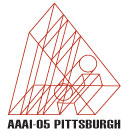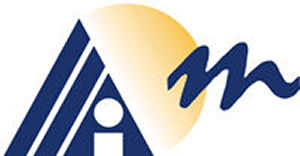|
—SCHEDULE—
The
reference for all papers:
In
K. R. Thórisson, H. Vilhjalmsson & S. Marsella (Eds.),
AAAI-05 Workshop on Modular Construction of Human-Like Intelligence,
Pittsburgh, PA, July 10. AAAI Technical Report WS-05-08, pp. XX-YY,
2005.
| |
|
|
pp. |
|
|
9:00
- 9:05 |
Workshop
Organizers |
INTRO |
vii |
PDF |
| 9:05
- 9:40 |
Hannes
Vilhjálmsson, Stacy Marsella |
Social
Performance Framework |
1-7 |
PDF |
| 9:40
- 10:05 |
Kristinn
R. Thórisson, Thor List, Christopher Pennock, John DiPirro |
Whiteboards:
Scheduling Blackboards for Semantic Routring of Messages & Streams |
8-15 |
PDF |
| 10:05
- 10:30 |
Thor
List, José Bins, Robert B. Fisher, David Tweed, Kristinn
R. Thórisson |
Two
approaches to a plug-and-play vision architecture CAVIAR and Psyclone |
16-23 |
PDF |
| 10:30
- 10:55 |
Kai-Yuh
Hsiao, Peter Gorniak, Deb Roy |
NetP:
A Network API for Building Heterogeneous Modular Intelligent Systems |
24-31 |
PDF |
| 10:55
- 11:15 |
BREAK |
|
|
|
| 11:15
- 11:50 |
Nikolaos
Mavridis, Deb Roy |
Grounded
Situation Models for Robots: Bridging Language, Perception, and
Action |
32-39 |
PDF |
| 11:50
- 12:15 |
Maren
Bennewitz, Felix Faber, Dominik Joho, Michael Schreiber, Sven Behnke |
Multimodal
Conversation between a Humanoid Robot and Multiple Persons |
40-47 |
PDF |
| 12:15
- 12:40 |
Matt
MacMahon |
Representing
Language, Action, Perception, and Space to Follow Route Instructions |
48-55 |
PDF |
| 12:40
- 14:10 |
LUNCH |
|
|
|
| 14:10
- 14:45 |
Andrew
S. Gordon |
Commonsense
Psychology and the Functional Requriements of Cognitive Models |
56-62 |
PDF |
| 14:45
- 15:10 |
Zippora
Arzi-Gonczarowski |
Modular
Assembly of Intelligence by Mathematical Abstractions |
63-70 |
PDF |
| 15:10
- 15:45 |
Alexei
V. Samsonovich
Kenneth A. De Jong |
Designing
A Self-Aware Neuromorphic Hybrid |
71-78 |
PDF |
| 15:45
- 16:05 |
BREAK |
|
|
|
| 16:05
- 16:40 |
Jesse
Gray, Cynthia Breazeal |
Toward
Helpful Robot Teammates: A Simulation-Theoretic Approach for Inferring
Mental States of Others |
79-85 |
PDF |
| 16:40
- 17:05 |
Rakesh
Gupta, Ken Hennacy |
Commonsense Reasoning about Task Instructions |
86-91 |
PDF |
| 17:05
- 17:30 |
Eric
Baumer, Bill Tomlinson |
Synthetic Social Construction for Autonomous Characters |
92-99 |
PDF |
| 17:30
- 17:45 |
Workshop
Organizers & attendees |
Discussion
& OUTTRO |
|
|
|
| |
| Building
intelligent systems that can collaborate and interact socially with
people requires integrating numerous technologies in complex ways.
For the A.I. researcher such integration can involve anything from
programming in multiple languages and connecting multiple computers,
to integrating several diverse theoretical models of perception,
communication, planning and action. The task requires a diverse
set of skills and tools to be applied and is clearly a challenge
for the field. We are looking for papers describing work on the
theoretical as well as practical issues of integrating broad human-like
skills into working systems. With
a rising interest in humanoid agents and robots for the home,
the push for creating well-rounded intelligent beings makes the
issue of integration increasingly relevant. Waiting for a single
inventor, graduate student, professor, university, or even company,
to invent and develop all of the needed tools and technologies
for such systems is not a viable option – it will take close
collaboration between individuals, teams, organizations, industry
and academia. However, collaboration is often hindered by |
different
language being used for similar things and different sets of solutions
being used for solving related problems, making integration a
difficult problem.
We
are looking for papers describing work on the theoretical as well
as practical issues of integrating broad human-like skills into
working systems, be it physical robots or virtual humans, and
work that evaluates current and past architectural efforts towards
building humanoid systems. Also relevant is work on new frameworks
and techniques for bridging between systems, as are practical
solutions and tools for making systems integration and the work
of the A.I. developer easier in this respect.
Of
special interest would be any rapid prototyping tools and tools
for exploring and comparing A.I. architectures. Anyone who is
building large, working systems, in software or hardware, that
integrate multiple diverse components in any combination –
be it planning, reasoning, natural language, computer vision,
hearing, gesture, emotion, common sense – and have taken
a moment to reflect on the integration problem, should find an
audience for their work in this workshop. |
Workshop
Format
There
will be two kinds of presentations, long and short. Long presentations
are 30 minutes; short presentations are 20 minutes. Both kinds are followed
by a 5 minute Q&A period.
Publication
Papers
will be included as AAAI technical reports in the AAAI Digital Library.
Dates
April
20 : Deadline for submissions of contributions
May 11: Authors' notification.
May 18: Submission of camera ready contribution
for the workshop notes. IMPORTANT: Accepted papers only have
a week to prepare a photoready copy. We regret this tight timeline,
but are unable to affect these dates, which are due to scheduling
problems in the conference itself.
July 9 or 10: Workshop
Paper
Format & Submission
Papers
should be no longer than 8 pages in the style specified by AAAI:
http://www.aaai.org/Publications/Author/macros-link.html
Send submissions as a single pdf file by email to the Workshop Chair
(thorisson ru.is).
The name of the file should be the last name of the first author. Please
specify in your email whether you wish to do a full or a short presentation.
Confirmation will be sent via email when your submission has been successfully
received. ru.is).
The name of the file should be the last name of the first author. Please
specify in your email whether you wish to do a full or a short presentation.
Confirmation will be sent via email when your submission has been successfully
received.
Selection will be based on relevance to the workshop, quality of the
work and clarity of presentation.
Program
Committee
Jan
Allbeck, U. Penn
Elisabeth André, Augsburg U.
Ruth Aylett, Heriot-Watt U.
Norman Badler, U. Penn
Tim Bickmore, B.U. School of Medicine
Cynthia Breazeal, M.I.T.
Joanna Bryson, U. of Bath
Magy Seif El-Nasr, Penn. State
Peter Gorniak, M.I.T.
Jonathan Gratch, USC/ICT
Ian Horswill, Northwestern U.
W. Lewis Johnson, USC/ISI
Stefan Kopp, Bielefeld U.
Thor List, Edinburgh U.
Anton Nijholt, U. of Twente
Catherine Pelachaud, U. of Paris
Scott Prevost, Animated Speech Corp.
Zsofia Ruttkay, U. of Twente
Push Singh, M.I.T.
Bill Swartout, USC/ICT
|
|

